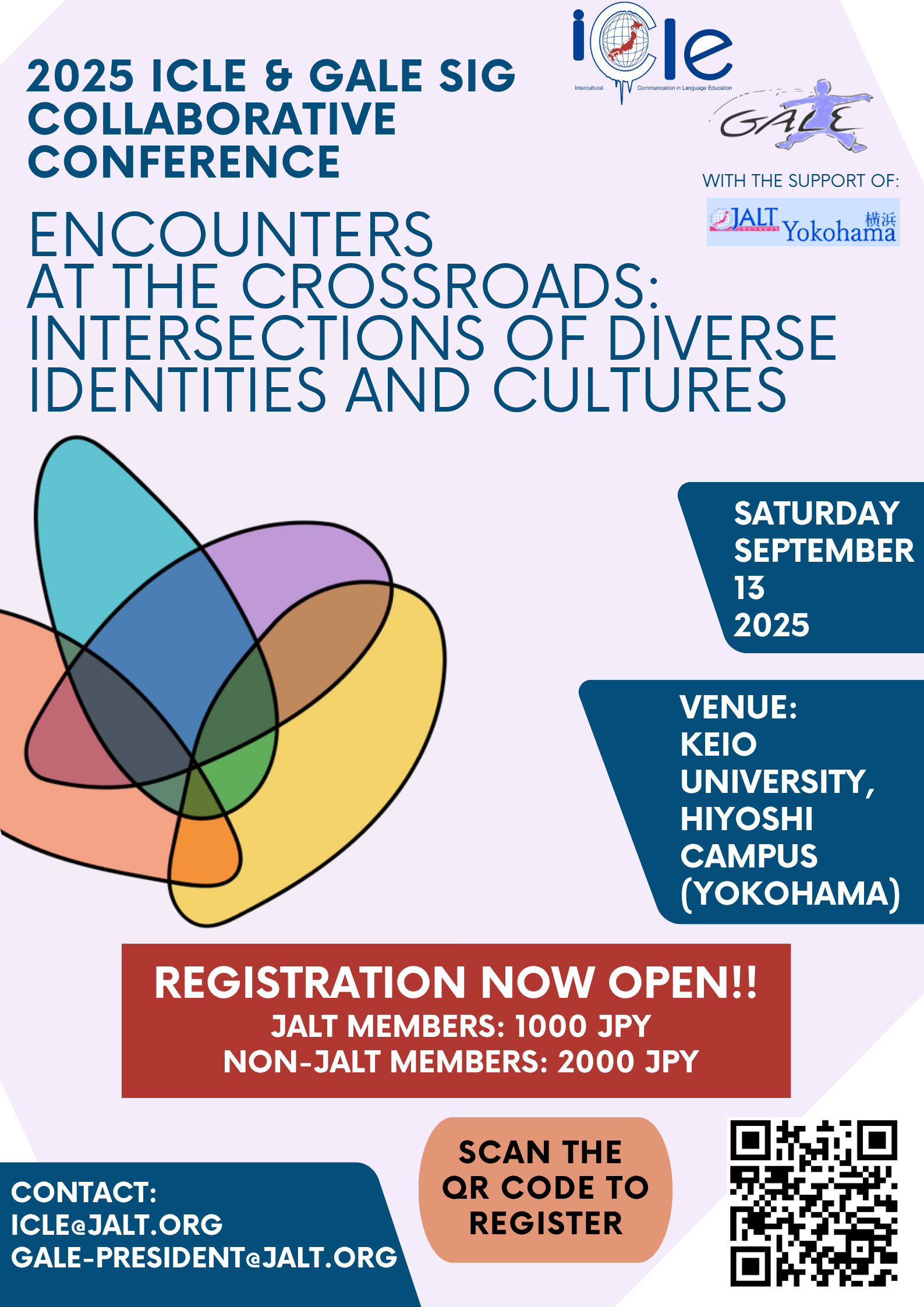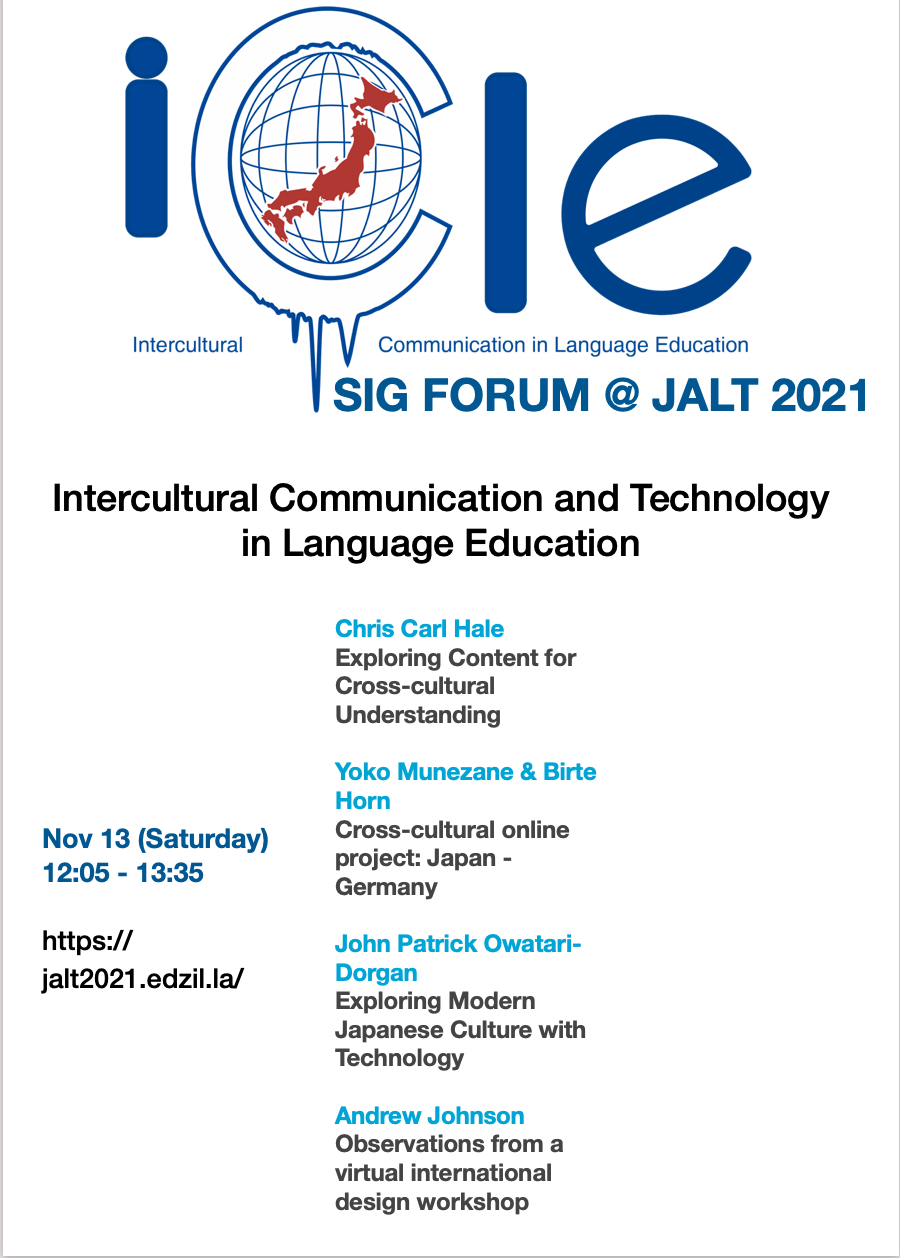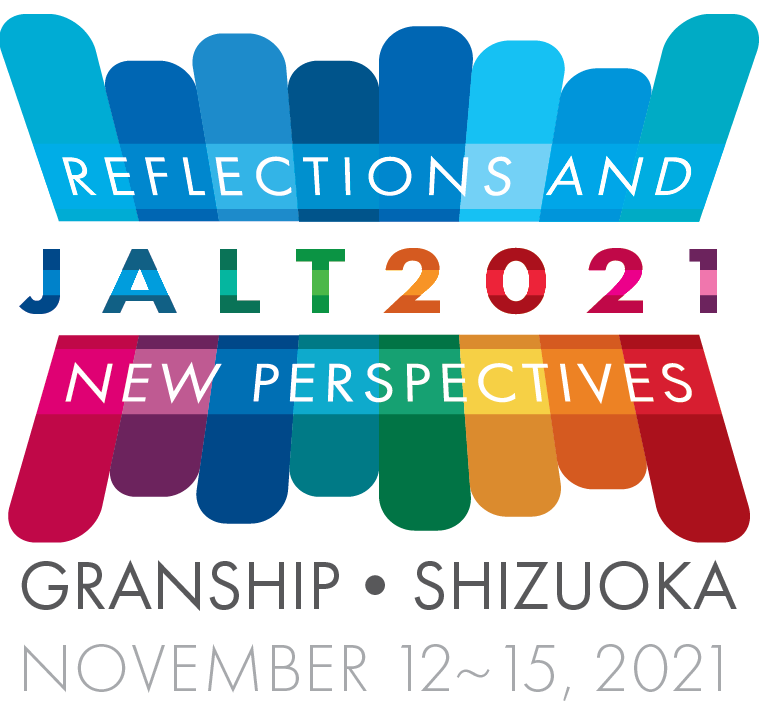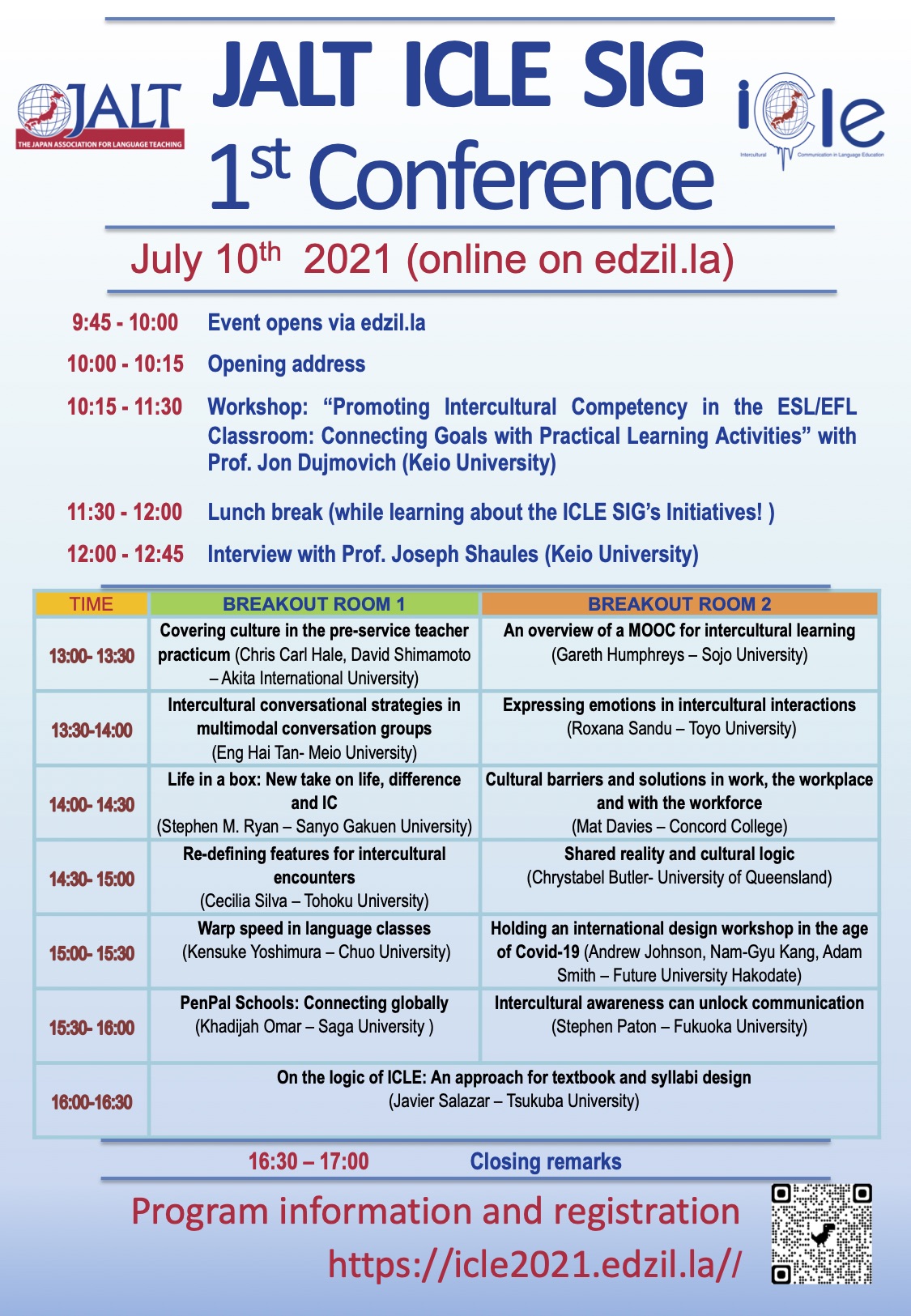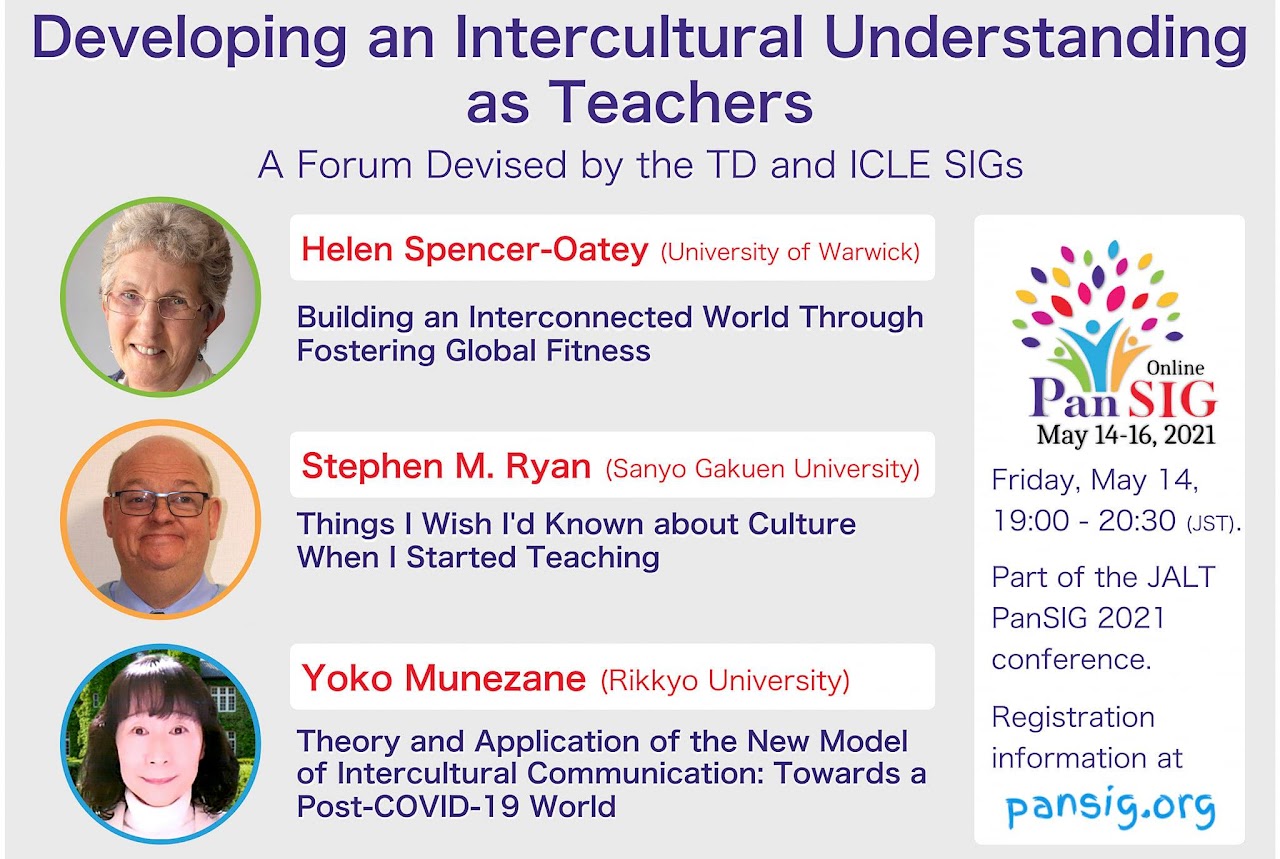Section outline
-
-
We'll be at Pan SIG 2026 so stay tuned for more information!
-
-
-
Visit the JALT National page for more details. Find specific details about the ICLE Events.
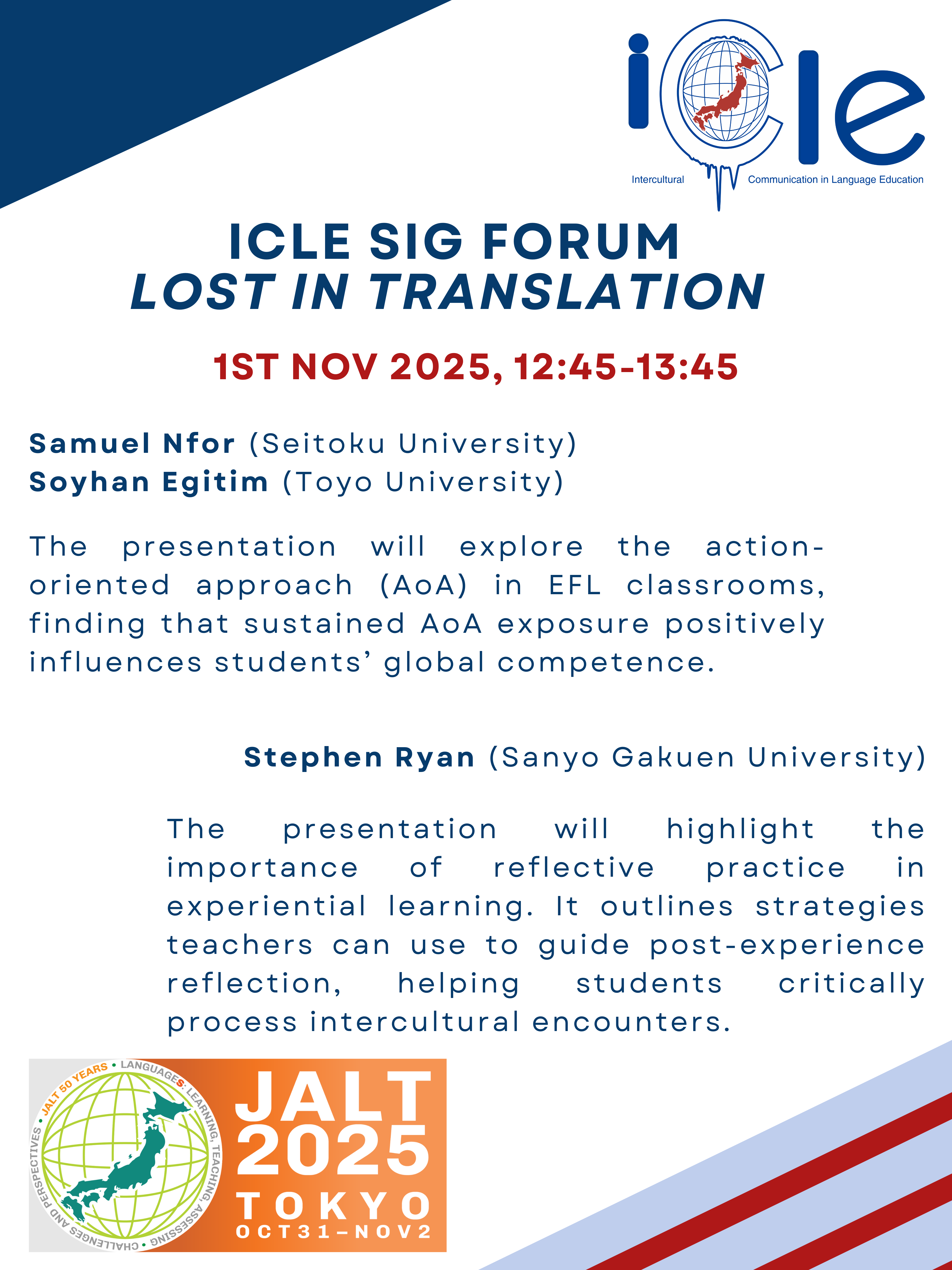
-
Join our Pre-JALT National 2025 Event!
Date: Saturday, October 25, 2025
Time: 17:30–18:30
Venue: Toyo University, Hakusan CampusSpeaker: Eileen Küpper, Bonn-Rhein-Sieg University of Applied Sciences
Topic: "Is Intercultural Communication a Future Skill? Building Global Competence in Tomorrow's Business World"After the workshop, we will continue the conversation over food and drinks at a nearby restaurant. If you would like to join us, please indicate so in the registration form here.
Registration deadline: October 17, 2025
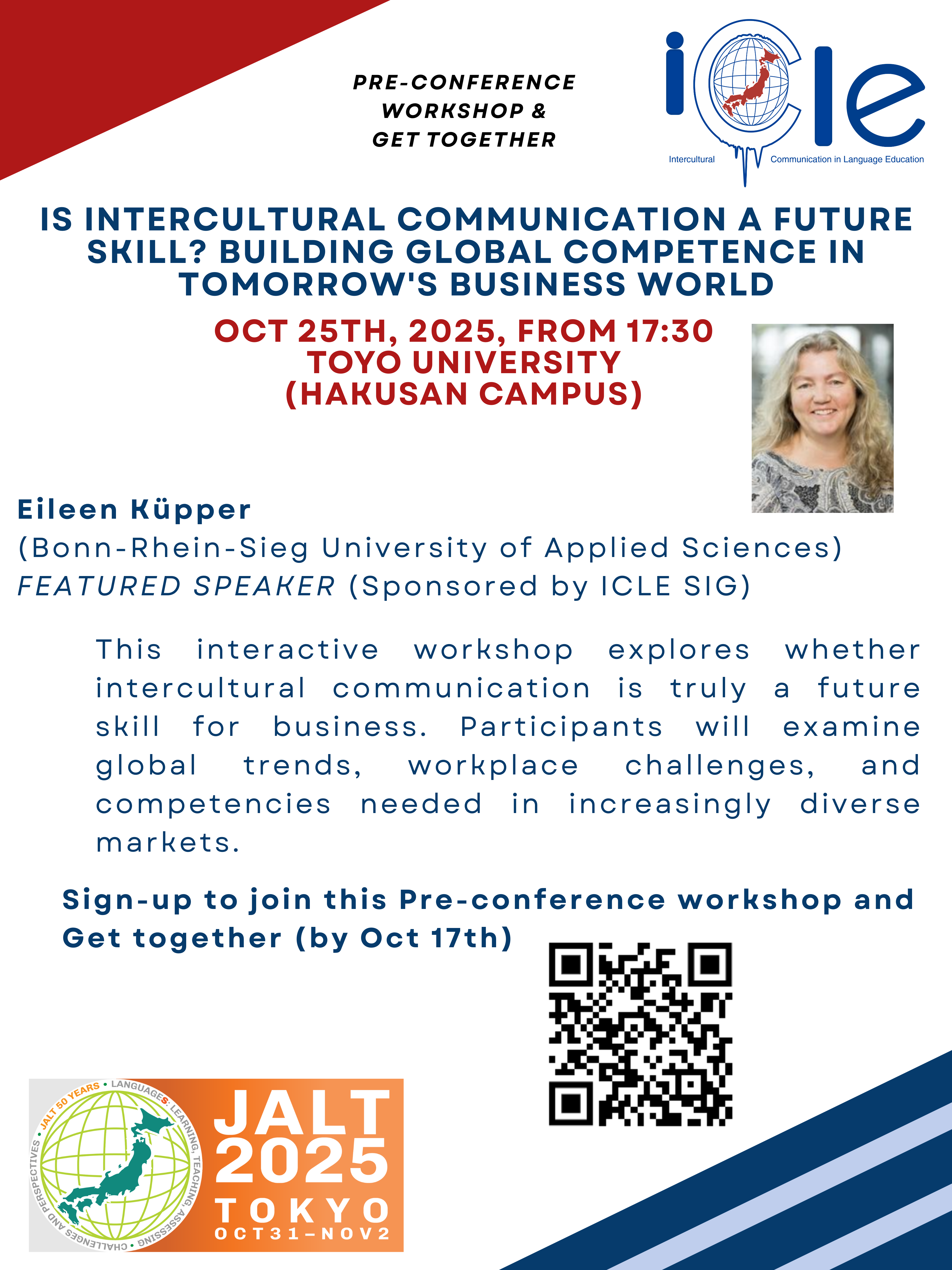
-
Drop by a visit our PanSIG 2025 forum.
-
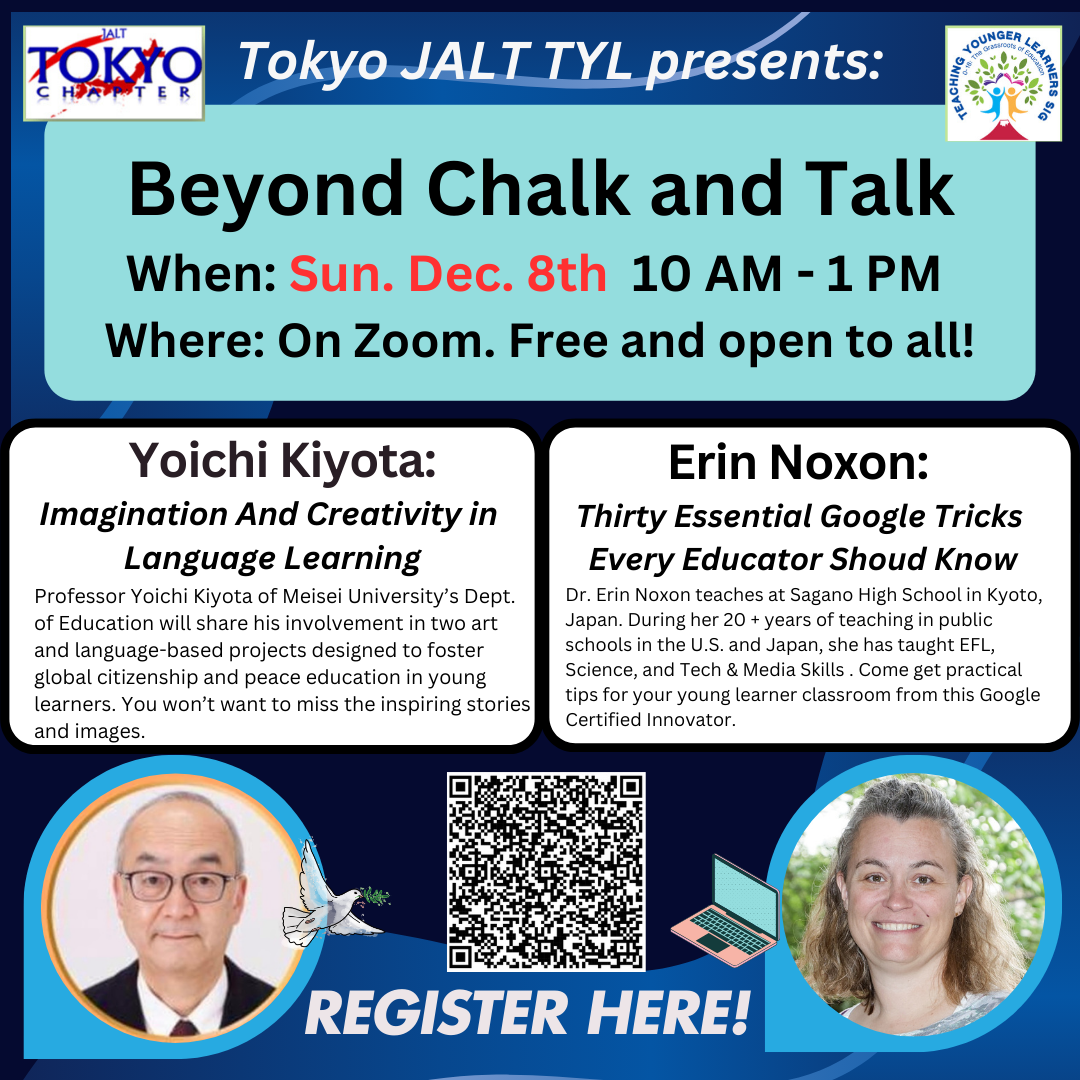
Imagination and Creativity for Language Learning
Presenter: Dr. Yoichi Kiyota
Date: December 8th, 2024
Time: Sun 10:00 - 13:00
More information at the Tokyo JALT site -
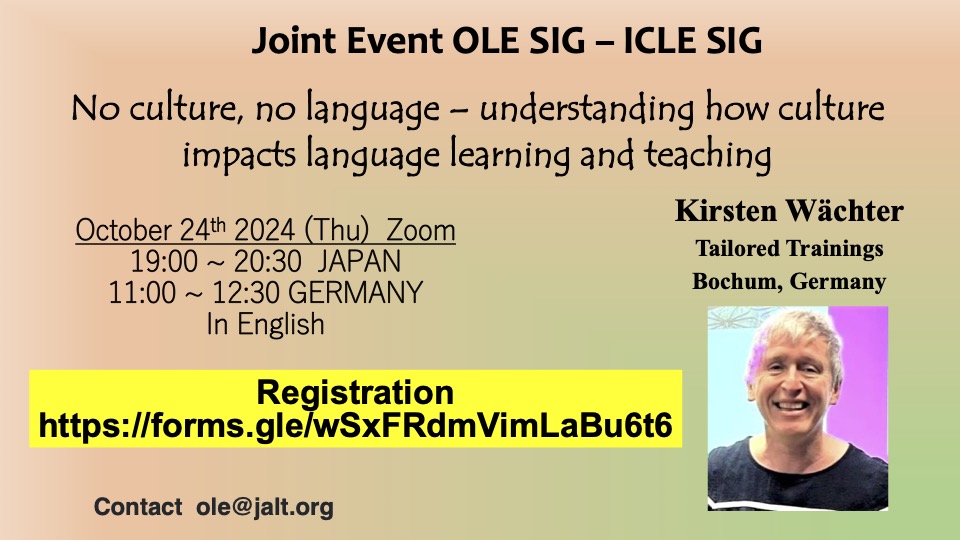
No culture, no language – understanding how culture impacts language learning and teaching
When we teach a foreign language, we teach students from different backgrounds and cultures, and we do that as teachers from different backgrounds and cultures, bringing in our own (first) language and cultural experience from which our learners benefit as often, interaction and communication requires strategies of a lingua franca, i.e. a common language shared by speakers from different linguistic backgrounds.
However, when looking at course materials and testing sheets, we can see that conventions of communication, expressions and politeness are still dominated by a native-speaker model. In this interactive workshop, we will explore to what extent we are moving away and have to move away from those conventions. As language teachers, we need to explore how pluricultural today’s teaching of language is and how important it is to integrate an understanding of the cultural impact factors on both language learning and teaching. We will explore what strategies can help to enable effective communication and collaboration, e.g. the use of questions, demonstrating sensitivity and skills of reflection as well as being able to anticipate certain issues like misunderstandings that might occur. Only awareness of these impact factors will help our learners to interact successfully by taking the sociolinguistic and cultural aspects of their communication and transactions into account. How we can implement such strategies in our language-teaching classroom and how our learners can see that they aremaking progress will be two key takeaways from this workshop.
Reference:https://rm.coe.int/cefr-companion-volume-with-new-descriptors-2018/1680787989
Bio:
Kirsten Waechter has been a business English trainer since 1998 teaching in-company courses and university students. Today she focuses on teaching business communication, ESP and intercultural courses. She is also a materials writer and translator.
-
When: September 28, 2024
Where: Kanda University of International Studies, Chiba
Theme: Exploring Diverse Identities - Developing Intercultural Sensitivity in Japan
Participation is Free
-
JALT ICLE will hold on forum at PanSIG 2024.
Theme: 'Back to Basics': Intercultural activities in the foreign language classroom
Do you have some ideas to share? Let us know how you connect theory to practice, while encouraging students to engage in intercultural communication! If you are interested, please send us an abstract by February 29, 17:00 (Japan time) here. We'll review the abstracts and get back to you before March 13.
Visit https://pansig.org/2024/ for more details on PanSIG 2024
-
The ICLE SIG is proud to participate in this year's JALTCALL Conference to discuss the intersection of culture and technology. Please join us!
Basic details:
- When: May 17-19 2024
- Where: Meijo University, Nagoya (Dome Mae Campus)
- Theme: The Impact of AI in Language Education
- Keynote speakers: Takako Aikawa & Joel Tetreault
- More information: https://jaltcall.org/jaltcall-2024
Registration details:
- Now open!
- JALT Member: 15,000 yen
- Non-member: 17,000 yen
- Student: 7,000 yen
- Registration by May 1st guarantees entrance to the Networking Reception
- (Late registrants cannot be guaranteed entrance to the networking reception)
- Registration page: https://events.jalt.org/event/1/registrations/19/
Keynote Speaker information:
- Takako Aikawa (MIT, Senior Lecturer in Japanese)
- AI-Enhanced Language Learning: Cultivating New Perspectives
- Before joining MIT’s Global Languages in 2013, Takako Aikawa honed her expertise in machine translation and natural language processing at Microsoft Research. At MIT she is responsible for directing the Japanese language program while utilizing technology for language learning.
- Takano CALL promo video:
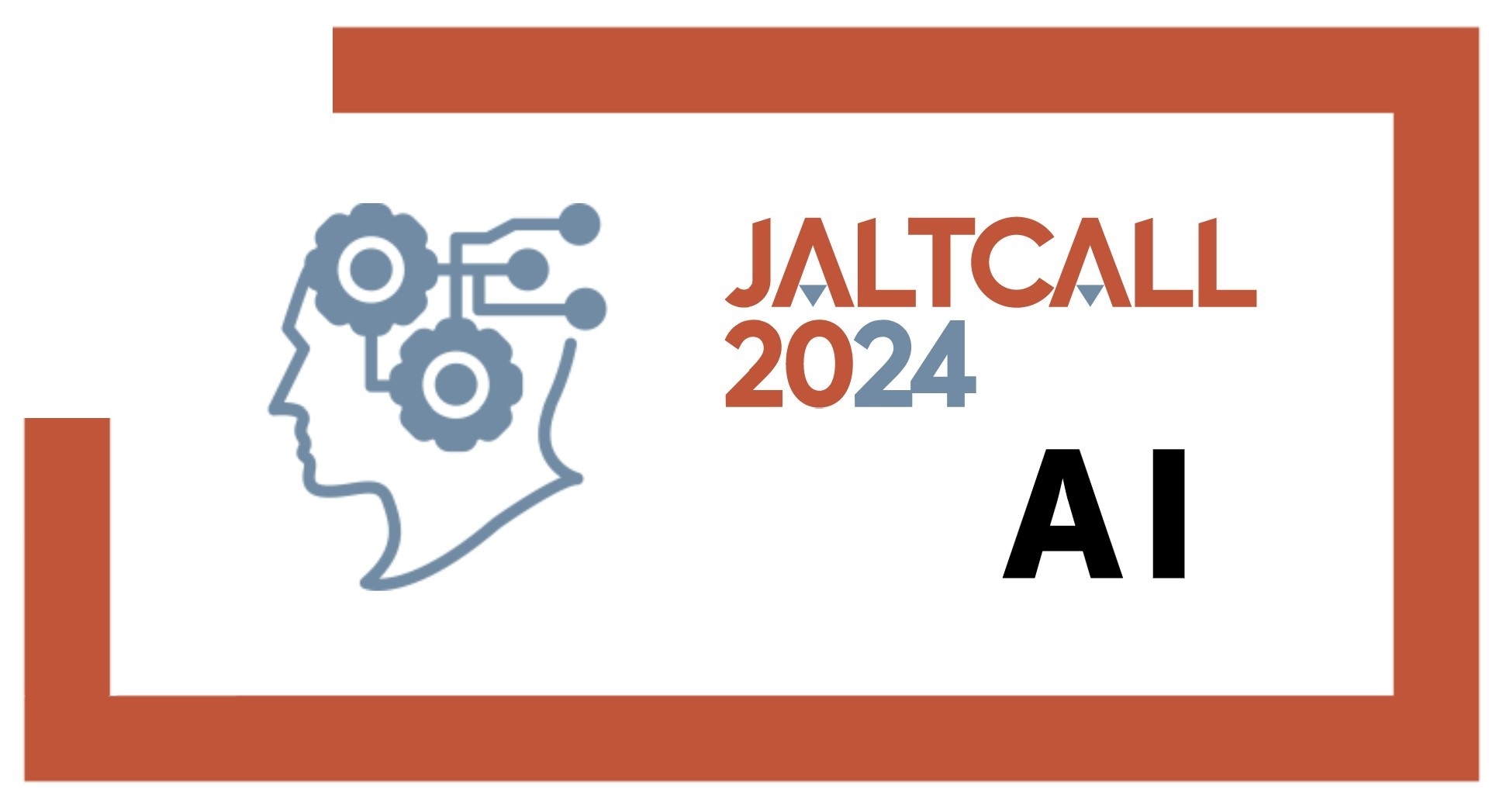
-
Yoko Munezane, from Rikkyo University, and the JALT ICLE SIG is inviting you to register for an exciting event. In the hope to bring to light some pressing issues for the intercultural community of educators and practitioners worldwide, we are honored to announce our guest speakers:
- Jean-Marc Dewaele, Honorary Professor at University College London and is Emeritus Professor at Birkbeck, University of London
- Hamza R’boul, research assistant professor in the Department of International Education at the Education University of Hong Kong.
* click on presenters' names above to see abstracts and bios
Date: February 10 (Saturday), 2024
Time: 16:30 (Japan time)
Place: Zoom (a Zoom link will be sent to all who registered before the event)
Fee: Free
This symposium is supported by Yoko Munezane (Rikkyo University), JSPS KAKENHI Grant Number JP19K00923 and the JALT ICLE SIG.
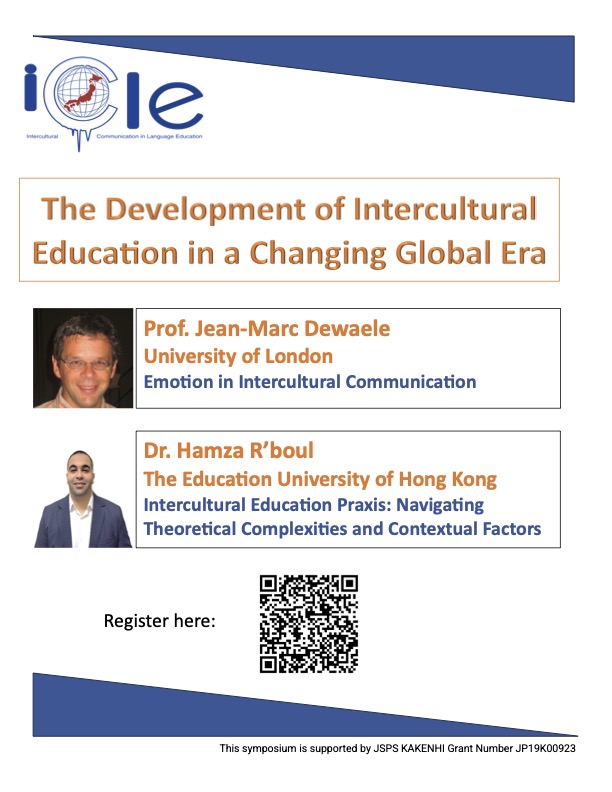
-
Nov 30, 2023: OLE / ICLE Joint Event → Dr. Adriana Diaz presentation
Zoom presentation:
Beyond Textbooks: Unveiling the Potential of Open Educational Resources in Language Instruction
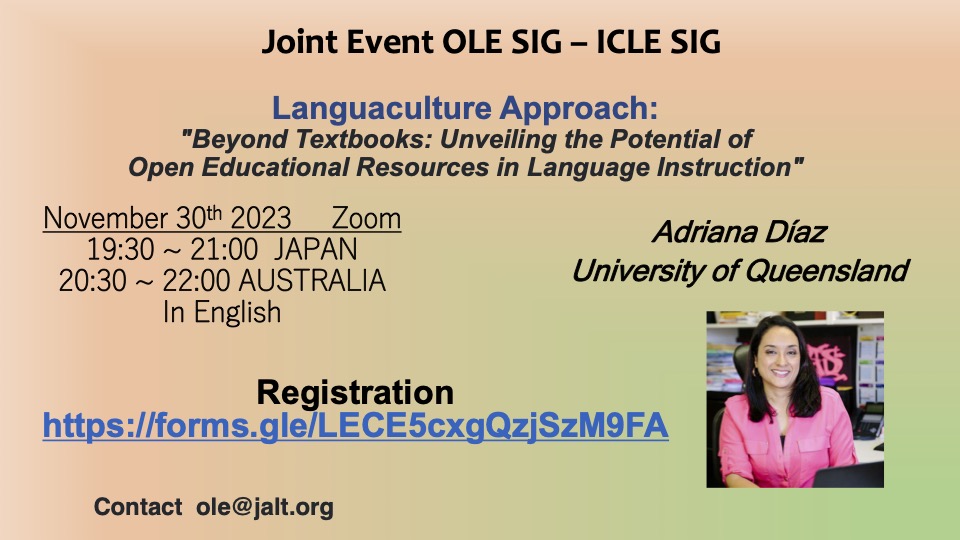
-
Visit jalt.org/conference for more details
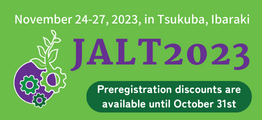
-
Conference theme: Intercultural Awareness and Addressing Global Issues: The Role of the Media in Conflict
Deadline for abstract submissions:May 19 (submithere)
Conference date: September 16 (Saturday)
Venue: Kanda University of International Studies
Participation fee: Free
Contact: iclesigprogramchair@gmail.com and gile@jalt.orgVisit the Conference section of this site for more information.
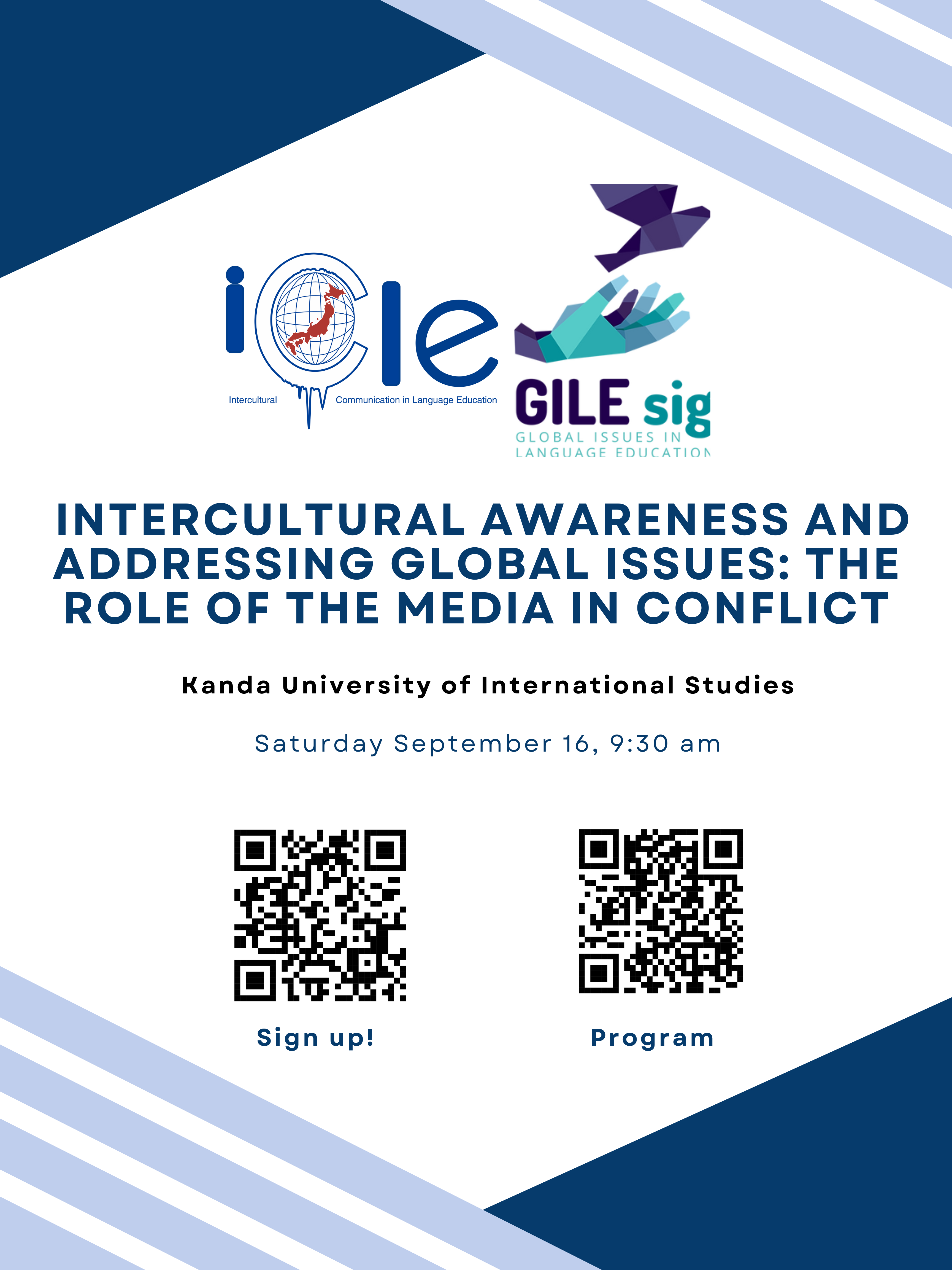
-
Visit pansig.org for more details
-
Invited Speaker: Diane Sasaki of SIETAR
-
Join us for the 2nd Annual JALT ICLE SIG Conference
Online & Free!
See the 2022 Conference Section for more details
-
The ICLE SIG PanSIG Forum
-
My ICLE Share #2: "Becoming a Better Intercultural Observer"

Presenter: Stephen M. Ryan
Saturday, July 2nd, 2022 (10:30am - 12:00pm)
This session is based on a series of activities designed to help students improve their observational skills. It is motivated by the thought that preparing students to encounter the cultural Other entails far more than giving them information about cultural differences and theories based on them. There are skills to be learned (observation is just one example) and attitudes to be formed.
The activities are designed to increase students’ awareness of the importance of being careful observers of their cultural context and to give them practical experience developing and using observation skills within the context in which they now live. By doing so, the students will (hopefully) learn to approach their intercultural experiences in a spirit of open enquiry, basing their interpretation of events around them on observational evidence rather than preconceived notions.
While originally designed to help students prepare to study abroad, these activities are in fact of value to anybody who takes an interest in the world around them and seeks to learn from it. Isn’t that we all want for our students?
-

In 2021, JALT ICLE started the Activity Initiative where we invite members to submit and share activities they use to promote intercultural communication and understanding with their students. In 2022, we invite you to join us to discuss some of these activities. These events will include two basic sections: a short discussion by the event submitter on how to use the event followed by a discussion time for all participants to talk about how the theme and how they could modify the activity for their students. In the first event of this style, we welcome Javier Salazar to talk about stereotypes and nationalities.
When: Saturday April 23, 2022 | 10:30am - 12:00
Where: Zoom → To receive the Zoom link, please pre-register here.
Topic: Stereotypes vs. Nationalities
Presenter: Javier Salazar
Discussant: Michael BoyceClassroom activity overview: Stereotypes are part of human nature ... and this in spite of the fact that they are among the many root causes of social problems such as racism, discrimination, xenophobia and even wars. There is a vast body of research in social psychology that suggests that “cognitive biases” determine how we perceive others that are labeled as the “Other” due to their preferences, interests, affiliations, gender/sexual orientation, ethnicity or nationality. In this sense, although cognitive biases constitute an important mechanism for humans to make sense of their environment (and the people that inhabit it) they inevitably lead to the formation of stereotypes. Even more, these stereotypes tend to be largely unconscious; in the sense that humans are usually unaware of how their own biases shape their perceptions of the “Other”. When it comes to learning a foreign language (and ultimately communicating with the “Other” through it) stereotype awareness becomes an essential element of true intercultural communication. In this activity, students will be “tricked” into making explicit the stereotypes they may (or may not) have of people from other nationalities, as a means to eliciting stereotype awareness.
-
ICLE SIG Forum: :
IC and Communities of PracticeThursday, November 19th, 5:30 PM - 7:00 PM; Room 4
- Context: College & University Education
- Content area: Culture (CUL)
- Format: Forum
- Delivery: Live (Zoom)
- Language: English
The world has been coming closer than ever, thereby, creating new communities based on diverse cultures. One of our roles as language teachers should be to build vibrant communities that are based on trust, and willingness to accept beliefs that are different than our own. Embracing this year's theme of "communities of teachers and learners", we discussed some practical ways adopted to reduce or eliminate any barriers that could have hindered a great learning experience.
Presenter(s): Valerie Hansford - Soka University; Eric Hagley - Hosei University
ICLE SIG Annual GENERAL meeting (AGM)
Thursday, November 19th, 7:15 PM - 8:00 PM; Room 4
-
Context: Non-teaching Context -
Content area: Culture (CUL) -
Format: SIG AGM -
Delivery: Live (Zoom) -
Language: English
This is the Intercultural Communication in Language Education (ICLE) SIG's annual general meeting. We aim to promote discussion about various approaches to teaching intercultural communication in a foreign language classroom. At this meeting, we reported on our ongoing activities and discussed plans for future activities and publications.
Presenter: Roxana Sandu - University of Tsukuba
-
ICLE SIG FORUM:
Maximize the Intercultural Learning ProcessAdopting this year’s conference theme, we discussed ways to encourage teacher efficacy and increase learner agency in the intercultural classroom. In this forum, the presenters (1) demonstrated how they have stimulated the learning process through intercultural language learning activities in their own teaching settings or (2) discussed the impact they believe they had on their students’ intercultural learning taking into considerations their own intercultural journeys.Presenter(s): Benthien, Gaby - Shumei University; Ouma, Mei - Meisei University; Salazar, Javier - Kanda Institute of Foreign LanguagesICLE SIG Annual GENERAL meeting (AGM)
Day: Sunday, November 3rdTime: 11:45 AM - 12:30 PM (45 minutes)Room: 906 -
We are pleased to inform you that the ICLE SIG will work with the JALT Tokyo Chapter. Meet us at Rikkyo University, Ikebukuro Campus, on June 28th, 2019.Check the attached flyer and the link below for more information.JALT Tokyo Chapter and ICLE SIG Event
-
Konan University, Nishinomiya
Bringing Culture into the Foreign Language Classroom
Culture permeates every single human act and is both a fascinating and daunting subject to bring into a foreign language classroom. Since the wide acceptance of the ‘language is indivisible from culture’ truism, foreign language teaching has faced the challenge of bringing this seemingly evident into the classroom. In this forum we look at the pedagogical considerations of deconstructing cultural phenomena in a way that can be practically taught to the language learner and how to tackle these challenges by introducing alternative ways to incorporate culture into the language classroom.
-
Time: 19:00-21:00
Location: Juntendo University, Hongo campus (Ochanomizu, Tokyo)
Cost: JII and JALT members: Free (Non-members may attend once for free)
Title: ‘Caught in the loop’: The engagement-resistance cycle in intercultural encounters
Facilitator: Roxana Sandu
Description: There is no doubt that intercultural interactions can cause either engagement or/and resistance in any party involved. Shaules (2017: 69-70) explains that “an encounter with foreignness imposes adaptive demands on learners, which they respond to with more or less acceptance of change, which generates engagement and/or resistance.” In the hope that intercultural communication will be viewed in a more positive way, freshman students at a Japanese university were asked to participate in an online exchange over a period of eight weeks. This exchange offered them the opportunity to connect with English learners from other countries via Internet using English as a lingua franca. The results of pre- and post-questionnaires administered to all Japanese students participating in the exchange, along with the data collected from seven follow-up interviews indicate students’ engagement, as in an overall more positive image towards intercultural communication. On the other hand, some students appeared to be caught in an engagement-resistance loop, showing both engagement and resistance towards this type of interaction either due to anxiety towards foreignness or intolerance to unpredictability and their own lack of communication skills. Participants will be encouraged to share their own experiences and analyze them from an engagement-resistance cycle point of view.
Facilitator Bio: Roxana Sandu (PhD, Tohoku University, Japan) is currently an assistant professor of English at University of Tsukuba. Her main publications are in the field of pragmatics and discourse analysis, but recently her research interests also include raising intercultural awareness in an EFL setting, as well as teaching 21st century skills, such as critical thinking, communication and collaboration.
-

